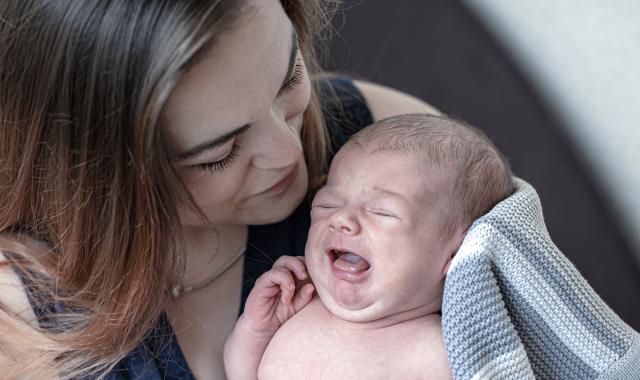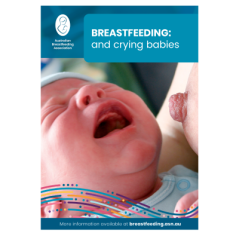Babies cry to communicate their needs. Your loving response helps them feel safe.

Babies cry because they need something. It’s their way of communicating and asking for help. Picking up, cuddling, or breastfeeding your crying baby won’t spoil them or create bad habits.
When your baby cries, they need you. The more upset they are, the more they need your comfort. Learning what upsets your baby can make it easier to cope. If you know the reason for their distress, it may be easier to be patient.
Common reasons babies cry
Hunger or thirst
Need for closeness
Need for sucking
Feeling tired/over or under stimulated
Feeling uncomfortable (e.g. too hot, needing a position change)
In pain or being unwell
What can help a crying baby?
Offering the breast is often the simplest and most effective way to comfort your baby. Breastfeeding isn’t just about food. It also provides warmth, security and a chance to suck, which is soothing and helps digestion.
Many parents are very surprised by how often their baby looks like they want to feed. Babies have small stomachs, breastmilk digests quickly, and feeding frequently – 8 to 14 times or more in 24 hours – is expected.
Even if your baby has just finished feeding, they may show feeding cues soon after, for any of the above reasons.
- If your baby is hungry, offering the breast will keep them satisfied, help them put on weight and help increase your milk supply.
- If they’re tired, breastfeeding will relax them and help them drift off to sleep. When you breastfeed, your baby’s body releases a hormone called cholecystokinin (CCK), which makes them sleepy. Read more in Helping your baby to sleep.
- If they need physical closeness, are overstimulated or under stimulated, breastfeeding is calming, releasing oxytocin to both you and your baby.
- If your baby has wind or a tummy pain, sucking at the breast causes waves of movement through their gut, from throat to lower bowel. This can help their digestion. Some babies like to keep sucking at the end of a feed when milk flow slows. This gives comfort without too much milk.
Other ways to calm your baby
Sometimes, even after feeding, babies need extra comfort. These gentle strategies can help:
- Skin-to-skin contact
Hold your baby against your bare chest with a light covering over both of you if you need warmth. Skin-to-skin contact can calm your baby. - Gentle movement
Rock your baby in your arms, walk around the room, or use a sling or carrier for hands-free soothing. Rhythmic motion is calming and can help an overtired baby relax. - Warm bath or shower
A bath can be very soothing. Some parents find that sharing a warm shower with their baby helps them settle. - Quiet environment
Reduce noise and bright lights. A calm space might make it easier for your baby to relax, especially if they’re overstimulated. - Massage and floor play
Lay your baby on a soft surface without a nappy and let them kick freely. Gentle leg cycling or a light massage can ease tension and help digestion. - Fresh air
Take your baby for a walk in the pram or a sling. A change of scenery and fresh air often helps babies settle and is calming for parents too. - Comforting wrap
Wrap your baby in a soft cotton or light wool blanket for a sense of security. Avoid overheating. - Soothing sounds
Soft humming, singing, or white noise can mimic the sounds your baby heard in the womb and help them feel safe.
Other reasons your baby may cry
Most crying is linked to common needs like feeding, comfort, or closeness. But sometimes there are other reasons:
- Fussy periods
Babies go through developmental stages where they cry more and want extra comfort. These phases often last a few days and are not just about hunger—they’re a sign your baby needs closeness and reassurance. Read more about fussy periods. - Lactose overload
Sometimes babies take in too much milk too quickly, which can cause discomfort. This is often linked to having a milk oversupply. More on lactose overload. - Occasional digestive issues
Occasionally, crying may be related to conditions such as reflux disease or sensitivities to certain foods in your diet. These are less common but if you’re concerned, speak to your health professional. - Some babies just cry more
If your baby cries a lot, you’re not alone - many parents experience this. This doesn’t mean you’re doing anything wrong. It’s part of early development. Crying often increases in the first few weeks, peaking around 6 to 8 weeks, and then gradually decreases by 3 to 4 months. Some babies cry for several hours a day, while others cry much less. Even babies who cry a lot generally grow well.1,2
Could it be wind or colic?
Sometimes babies cry and there doesn’t seem to be a reason, so people call it ‘wind’ or ‘colic’. The term ‘colic’ isn’t scientific. It’s often used when doctors can’t find anything wrong with a baby who cries a lot. Using the term ‘colic’, can make parents feel there’s a medical problem and start searching for solutions, adding to their stress and exhaustion. Many babies who cry a lot still grow well and usually outgrow this phase by 3 to 6 months.
Responding to your baby’s cues
The Australian Association for Infant Mental Health (AAIMH) encourages parents to respond promptly and gently to their baby’s signals – including crying.3 Responding promptly helps your baby feel safe and supports healthy emotional development. Babies rely on caregivers to meet their needs for comfort, food, and security. When you respond in a warm and consistent way, it helps your baby feel safe and builds the foundation for healthy emotional development. Crying is your baby’s way of communicating, and your loving response matters.
When crying feels overwhelming
Crying can be hard for babies and exhausting for parents. It’s understandable to feel upset when nothing seems to calm your baby. If you start feeling frustrated or angry, take a pause. Share the care with someone else if you can. If you’re alone, place your baby in a safe space, like their cot, and take a few minutes to breathe and calm yourself.
Looking after your own wellbeing helps you care for your baby. If you ever feel unable to cope, reach out to a trusted person or call the ABA Helpline for support.
© Australian Breastfeeding Association December 2025
- Royal Children’s Hospital Melbourne. Clinical Practice Guideline: Unsettled or Crying Babies. Melbourne: RCH; updated 2023. Available from: https://www.rch.org.au/clinicalguide/guideline_index/Crying_Baby_Infant_Distress/
- Wolke D, Bilgin A. Systematic Review and Meta-analysis of Crying Duration in Infants. Child Development. 2022;93(4):1201–1218. https://doi.org/10.1111/cdev.13791
- Australian Association for Infant Mental Health. Responding to Baby’s Cues. Position Paper 2. Reviewed May 2016. Available at: https://www.aaimh.org.au/resources/position-statements-and-guidelines/AAIMHI-Position-paper-2-(2016)-Responding-to-infant-cues-(1).pdf
Learn more about crying babies
Online interactive session free for members
Newborn Virtual Village - Learning your baby's feeding and other cues

Evidence-led info and practical tips from our Parenting Information Series
Breastfeeding: and crying babies




